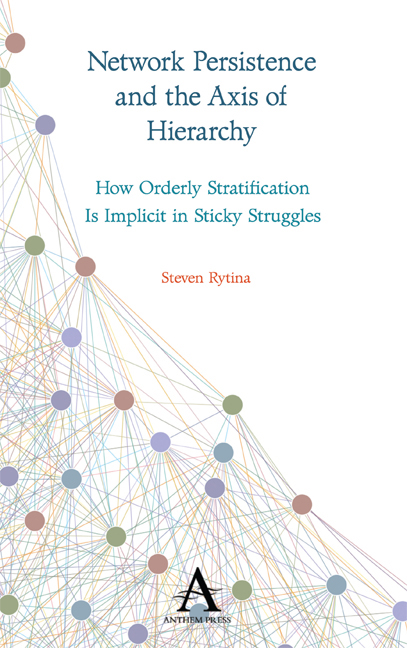 Network Persistence and the Axis of Hierarchy
Network Persistence and the Axis of Hierarchy Book contents
- Frontmatter
- Contents
- List of Illustrations
- Preface
- Chapter One Sticky Struggles: The Unified Pattern of Social Ranks Inherent in Networks
- Chapter Two Foundations of Cacophony
- Chapter Three Knots of Regularity
- Chapter Four Hierarchy: Inevitable but Inevitably Messy
- Chapter Five The Inevitable Emergence of Stratification
- Chapter Six Scaling Intergenerational Continuity: Is Occupational Inheritance Ascriptive After All?
- Chapter Seven Taming the Mobility Table
- Chapter Eight Is Occupational Mobility Declining in the United States?
- Chapter Nine The Continuum of Class over Time: Deconstructing Imposed Class to Uncover Empirical Classes
- Chapter Ten Concluding Reflections
- Appendix Why Robust Attraction Is (Effectively) Inevitable for Mobility Data
- Index
Chapter Five - The Inevitable Emergence of Stratification
Published online by Cambridge University Press: 30 April 2020
- Frontmatter
- Contents
- List of Illustrations
- Preface
- Chapter One Sticky Struggles: The Unified Pattern of Social Ranks Inherent in Networks
- Chapter Two Foundations of Cacophony
- Chapter Three Knots of Regularity
- Chapter Four Hierarchy: Inevitable but Inevitably Messy
- Chapter Five The Inevitable Emergence of Stratification
- Chapter Six Scaling Intergenerational Continuity: Is Occupational Inheritance Ascriptive After All?
- Chapter Seven Taming the Mobility Table
- Chapter Eight Is Occupational Mobility Declining in the United States?
- Chapter Nine The Continuum of Class over Time: Deconstructing Imposed Class to Uncover Empirical Classes
- Chapter Ten Concluding Reflections
- Appendix Why Robust Attraction Is (Effectively) Inevitable for Mobility Data
- Index
Summary
To this point, the account has been deliberately eclectic with regard to rank.
Networks are sticky. People are subject to obligations that most are inclined to honor. Some people go to jobs. Usually it is the same job. Where it is not the same job, narrow, demanding criteria of similarity are often applied. Jobs are embedded in exclusive, repetitive gatherings. This sets particular jobs apart from nearly all others. It ensures that many jobs are performed subject to terms and conditions that are poly- lateral and resistant to alteration.
As this was initially summed up, social life is messy and social life is repetitive.
More texture has been added as the argument unfolds. Networks tend to be conserved. Uniformity therefore extends to matters that people greatly care about. Who gets what on what grounds is included.
This can be used to construct a framework for examining stratification. The network framework features time, local consistency, and potentially vast complexity. The goal is to investigate what this entails for the empirical study of stratification and, more narrowly, for the study of occupational mobility.
Within this proposed framework, notions like coded occupations or variables such as occupational scales (or many other alternatives) are restricted transformations. Under assumptions that are quite undemanding, the passage of time will result in simplification. And that will provide a backdrop within which “variables disappear.” In their stead emerges a robust attractor, a dominant dimension that mediates access to better and worse.
The Ultimate Data Set
The journey can begin with a conception that was the actual source of inspiration for the thought experiment that follows shortly.
Imagine into existence an ideal data set for studying stratification. Values would be available for all cases, as in a census. Since costs are no barrier to ideals, this census would record values every day, day after day. It would include a rich set of indicators about access to possible goods, services, and situations that are scarce and desirable. Wealth, earnings, indicators of earnings capacity for those not in jobs, health, social popularity, housing stock, quality of automobiles, and a very long list of other possibilities satisfy this.
Three initial properties help inform intuition. First, most of these will change slowly.
- Type
- Chapter
- Information
- Network Persistence and the Axis of HierarchyHow Orderly Stratification Is Implicit in Sticky Struggles, pp. 127 - 150Publisher: Anthem PressPrint publication year: 2020


